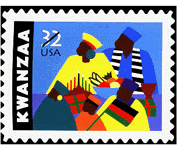|
About This Daily Classroom Special
Kwanzaa was written by Robert O. Black, teacher at Harbour City Service Learning Program and
former Teachers Network web mentor.
Kwanzaa
What Is Kwanzaa?
 The principles of Kwanzaa hold special value for many African Americans and reach across cultural boundaries as well. The values emphasized during the week-long celebration are designed to enhance relationships among individuals and families, which can ultimately lead to better communities." The principles of Kwanzaa hold special value for many African Americans and reach across cultural boundaries as well. The values emphasized during the week-long celebration are designed to enhance relationships among individuals and families, which can ultimately lead to better communities."
Created in 1966 by Dr. Karenga, chairman of the Department of Black Studies at California State University -Long Beach, Kwanzaa is a seven-day cultural celebration that takes its name from the Swahili phrase meaning "first fruits" and honors the African tradition of celebrating the harvest.
The Festival
The cultural festival--which begins December 26 and ends on January 1--celebrates and reinforces family, community and culture through practices and affirmations related to the Nguzo Saba , The Seven Principles. The Seven Principles observed during Kwanzaa are Umoja (unity), Kujichagulia (self determination), Ujima (collective work and responsibility), Ujamaa (cooperative economics), Nia (purpose), Kuumba (creativity), and Imani (faith).
The Seven Symbols
Kwanzaa has seven basic symbols which represent its spirit and focus: the Mkeka, the straw mat on which all other objects are placed; the Mazao, which symbolize the harvest origins of the holiday; the Kinara, which is a candle holder which holds seven candles and represents the ancestral stalk from which African American people come; Mishumaa, the three green, three red and one black candle that represent the Nguzo Saba; Muhindi, ears of corn representing the children in the house and community; Kikombe Cha Umoja, the Unity Cup that is used to pour libation and passed to each member of the family to sip from in a gesture of unity and commitment to Kwanzaa; and Zawadi, culturally-based gifts for children which must include a book and heritage symbol. A Karamu, an African feast, is held on December 31. The final day of Kwanzaa is a day of meditation (Taamuli) dedicated to sustained reflection on human life and purpose and the central values of African culture.
Make sure to visit the American
Museum of Natural History's Kwanza site.
|